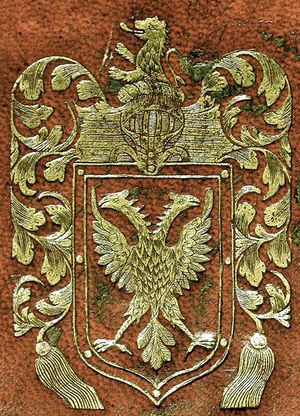Difference between revisions of "Thomas Killigrew 1612-1683"
| (5 intermediate revisions by the same user not shown) | |||
| Line 1: | Line 1: | ||
__NOTITLE__ | __NOTITLE__ | ||
| − | ===[[name::Thomas]] [[name::KILLIGREW]] [[date of birth::1612]]-[[date of death::1683 | + | ===[[name::Thomas]] [[name::KILLIGREW]] [[date of birth::1612]]-[[date of death::1683]]=== |
| − | [[File:KilligrewThomas1.jpg| thumb | + | [[File:KilligrewThomas1.jpg| thumb | Armorial stamp of Thomas Killigrew (British Armorial Bindings)]] |
| − | |||
====Biographical Note==== | ====Biographical Note==== | ||
| − | [[occupation:: | + | Born at [[place of birth::Lothbury, London]], son of Sir [[family::Robert Killigrew]], [[occupation::courtier]] and [[occupation::MP]]. He entered court service and by 1632 was a [[occupation::page of honour]] to the King; shortly afterwards he began writing and staging plays, beginning with ''The Prisoner'' (1635). He travelled in [[location::Europe]] around 1640; supporting the King during the Civil War, he was again in [[location::Europe]] in the late 1640s and 1650s, with a series of diplomatic missions on behalf of the exiled court. At the Restoration he settled in [[location::London]], where he and Sir [[associates::William Davenant]] were licensed to erect two playhouses; Killigrew established the [[organisations::King's Company]] of players, and became a successful theatre manager, while continuing to write plays. Towards the end of his life, when he withdrew from the theatre, he was in some financial difficulties. |
====Books==== | ====Books==== | ||
| − | + | A small number of books decorated with his armorial stamps are recorded in the Armorials database; the extent of his library is not known. His will has no reference to books; most of his estate was left to his son [[family::Henry Killigrew|Henry]]. | |
====Sources==== | ====Sources==== | ||
<div id="sourcelist"> | <div id="sourcelist"> | ||
| + | *[https://discovery.nationalarchives.gov.uk/details/r/D755577 Will of Thomas Killigrew, The National Archives PROB 11/372/365]. | ||
*[https://armorial.library.utoronto.ca/stamp-owners/KILL001 British Armorial Bindings]. | *[https://armorial.library.utoronto.ca/stamp-owners/KILL001 British Armorial Bindings]. | ||
*Motten, J. P. Vander. [https://doi.org/10.1093/ref:odnb/15538 "Killigrew, Thomas (1612–1683), playwright and theatre manager."] ''Oxford Dictionary of National Biography''. | *Motten, J. P. Vander. [https://doi.org/10.1093/ref:odnb/15538 "Killigrew, Thomas (1612–1683), playwright and theatre manager."] ''Oxford Dictionary of National Biography''. | ||
| + | *[https://celm-ms.org.uk/introductions/KilligrewThomas.html Thomas Killigrew, ''Catalogue of English literary manuscripts 1450-1700'']. | ||
</div> | </div> | ||
{{DEFAULTSORT:Killigrew, Thomas}} | {{DEFAULTSORT:Killigrew, Thomas}} | ||
| − | [[Category: | + | [[Category:AuthorsPoets]] |
[[Category:Armorial Stamps]] | [[Category:Armorial Stamps]] | ||
| − | [[Category: | + | [[Category:All Owners]] |
Latest revision as of 22:15, 20 May 2021
Thomas KILLIGREW 1612-1683
Biographical Note
Born at Lothbury, London, son of Sir Robert Killigrew, courtier and MP. He entered court service and by 1632 was a page of honour to the King; shortly afterwards he began writing and staging plays, beginning with The Prisoner (1635). He travelled in Europe around 1640; supporting the King during the Civil War, he was again in Europe in the late 1640s and 1650s, with a series of diplomatic missions on behalf of the exiled court. At the Restoration he settled in London, where he and Sir William Davenant were licensed to erect two playhouses; Killigrew established the King's Company of players, and became a successful theatre manager, while continuing to write plays. Towards the end of his life, when he withdrew from the theatre, he was in some financial difficulties.
Books
A small number of books decorated with his armorial stamps are recorded in the Armorials database; the extent of his library is not known. His will has no reference to books; most of his estate was left to his son Henry.
Sources
- Will of Thomas Killigrew, The National Archives PROB 11/372/365.
- British Armorial Bindings.
- Motten, J. P. Vander. "Killigrew, Thomas (1612–1683), playwright and theatre manager." Oxford Dictionary of National Biography.
- Thomas Killigrew, Catalogue of English literary manuscripts 1450-1700.
